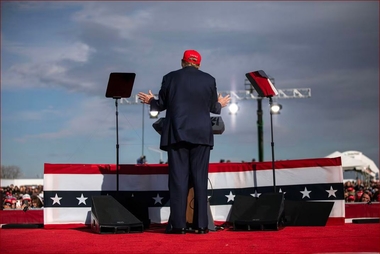AT A campaign rally in Dayton last weekend, Donald Trump said something that released a tsunami of outrage and scorn from Democrats and the left-leaning media. During a Supreme Court oral argument two days later, Justice Ketanji Brown Jackson said something that released a tsunami of outrage and scorn from Republicans and the right-leaning media.
 Former president Donald Trump at a rally in Dayton, Ohio, on March 16. |
In neither case was there anything scurrilous or shocking about the remark in question. What was reprehensible was the way the remarks were willfully misrepresented by ideological partisans who didn't scruple to distort the truth in order to advance a political narrative and discredit a political foe.
What Trump said was that "it's going to be a bloodbath for the country" if he doesn't win the presidential election in November. Seizing on the word "bloodbath," a liberal chorus instantly raised an alarm.
"It's clear this guy wants another January 6," President Biden posted on X, as his campaign released an ad raising the specter of civil unrest. Politico headlined its story "Trump says country faces 'bloodbath' if Biden wins in November." Similar headlines appeared above stories on NBC, CBS, and The Guardian. Senator Brian Schatz of Hawaii, a Democrat, advised the media to pile on: "Headline writers: Don't outsmart yourself," he urged on X. "Just do 'Trump Promises Bloodbath if he Doesn't Win Election.'" Presidential historian Michael Beschloss, a frequent TV talking head, told MSNBC that Trump's comment was reminiscent of "fascism and totalitarianism and in Germany's case the Holocaust."
There was just one thing wrong with this apocalyptic keening: Trump's "bloodbath" reference had nothing to do with riots. It was a metaphor for the disaster that, according to Trump, awaits the auto industry and the US economy if Biden's policies continue. He wasn't inciting violence. He was denouncing free trade and anticipating economic misery if he isn't elected to pursue harsh protectionist measures.
In context, Trump's meaning was unambiguous. "We're going to put a 100 percent tariff on every single car that comes across the line and you're not going to be able to sell those," Trump told his Dayton audience. "Now if I don't get elected, it's going to be a bloodbath. . . . That'll be the least of it. But they're not going to sell those cars."
Trump's syntax was klutzy, but the audience understood him. In video of the rally, the crowd can be seen applauding enthusiastically at his talk of crippling tariffs; the "bloodbath" line got no reaction at all. Even MAGA loyalists who revel in Trump's red-meat rhetoric knew he wasn't saying anything provocative at that moment.
Perhaps the worst thing about the feeding frenzy over "bloodbath" is how pointless it was. Trump routinely makes comments that are genuinely shocking and indecent. On multiple occasions he has encouraged violence or predicted ugly brawls if he doesn't get his way. His behavior on Jan. 6 was appalling, as is the way he continues to defend the Capitol rioters. So why whip up a storm over something atrocious that Trump didn't say? All that accomplished was to reinforce the conviction among Trumpians that the man they idolize is a martyr.
Just as shameless was the right-wing bashing of Justice Jackson that followed Monday's oral argument in Murthy v. Missouri. The case deals with the Biden administration's pressure on social media platforms to suppress posts containing what it deemed wrong or harmful information. Was such pressure an unlawful infringement of free speech? Or was it permitted government engagement with the tech firms?
During a colloquy with Louisiana Solicitor General Benjamin Aguiñaga, who argued that the Biden administration had crossed a constitutional line when it pushed social media platforms to remove certain content, Jackson said: "My biggest concern is that your view has the First Amendment hamstringing the government in significant ways."
Instantly, the conservative/Republican spin machine blew up over the word "hamstringing," bewailing the failure of a Supreme Court justice to understand the function of the Bill of Rights.
"Free speech is on trial at the Supreme Court, but Justice Kentanji Brown Jackson is no fan of the First Amendment," reported The Federalist, a prominent conservative website. "The Constitution, you see, limits the government. But leftists want unlimited government — which is why they hate the Constitution."
Senator Mike Lee, a Utah Republican, snorted: "The whole point of the First Amendment — and of the Constitution — is to 'hamstring the government in significant ways.'" Fox News rounded up a cornucopia of condemnations making the same point. Typical was the statement issued by the State Freedom Caucus Network, a well-connected conservative group: "'I'm concerned that the Constitution is limiting the power of the government' is a completely insane thing for somebody to say who sits on the highest court in the land." In a TV interview, Representative Jim Jordan of Ohio, the Republican chairman of the House Judiciary Committee, went even further. He called Jackson's remark "literally one of the craziest things I've ever seen" and added: "That is frightening. Because if she really believes that, that is scary where we are heading."
But like the left's furor over Trump's "bloodbath" comment, the right's furor over Jackson's "hamstringing" required ripping her words out of context.
The crux of the case before the court is where, under the First Amendment, the line should be drawn between unlawful government actions meant to penalize speech and permitted government efforts to influence speech. At one point, Jackson posed an extreme hypothetical designed to sharpen the issue at stake.
Suppose young people were caught up in a new social media challenge — one "that involved teens jumping out of windows at increasing elevations," she said. Imagine that kids all over the country had started doing this and were "injuring or even killing themselves." In such an alarming scenario, could the government put pressure on the tech platforms to take down the dangerous posts?
 Supreme Court Justice Ketanji Brown Jackson |
No, replied Aguiñaga. "The moment that the government tries to . . . pressure them to take it down, that is when you're interfering with [First Amendment] speech rights."
That — the absolutist position taken by the lawyer arguing before the court — was what led Jackson to wonder whether the Constitution really mandates the "hamstringing" of the government in such circumstances. Her qualms reflected not a leftist hunger for unlimited government but a prudential grappling with how to square protection of free speech with the obligation of government officials to protect the public from harm. Some of the court's conservative justices, including Brett Kavanaugh and Amy Coney Barrett, appeared to share some of the same qualms.
In short, Jackson was doing what Supreme Court jurists are expected to do — analyzing a challenging issue in order to interpret and apply the words of the Constitution. Her critics, by contrast, were engaging in ugly demagoguery, twisting her meaning in order to score some cynical soundbites and pour a little more lighter fluid on our incendiary political discourse.
On a personal level, Jackson and Trump aren't likely to suffer from these dishonest cheap shots. America's democracy may be a different story.The nastiness of our civic dialogue is more toxic now than it has been in a century. How much lower can it sink before recovery becomes impossible?
(Jeff Jacoby is a columnist for The Boston Globe).
-- ## --
Follow Jeff Jacoby on X (aka Twitter).
Discuss his columns on Facebook.
Want to read more? Sign up for "Arguable," Jeff Jacoby's free weekly email newsletter.

